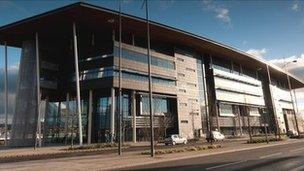Concern over 'forced' uni merger in south east Wales
- Published

The University of Wales, Newport, would merge with the University of Glamorgan and Cardiff Metropolitan
The National Union of Students said it is concerned by suggestions a merger of universities could be "forced" to create a new "super" institution in south east Wales.
Education Minister Leighton Andrews has proposed merging the University of Glamorgan, Cardiff Metropolitan and Newport University.
But Cardiff Metropolitan previously said it was against the plan.
The NUS said students must be priority as universities "thrash out" details.
Mr Andrews gave details of the blueprint for the future of higher education in Wales on Tuesday, saying he wanted to create "strong, successful and sustainable" universities.
Among his proposals was the plan to replace the University of Glamorgan, Cardiff Metropolitan University and University of Wales, Newport with a "super" university, with campuses across the region.
They will now be consulted on the plans.
Cardiff Metropolitan, which previously went by the name University of Wales Institute, Cardiff (Uwic), had previously said it did not want to be part of a merged south east Wales university.
After the education minister's proposals were announced it said its board of governors would consider them at their next meeting.
However, BBC Wales education correspondent Ciaran Jenkins said the minister has the power to force through the merger because the three universities do not have a royal charter, like older institutions do.
'Stand off'
The NUS warned such a move "would not be helpful".
"While the details are being thrashed out between institutions, we warn against losing sight of what is fundamentality important - the individual students that will be affected by these proposals," said NUS Wales President Luke Young.
"I am concerned by the suggestion of forced mergers and dissolution of universities.
"It will not be helpful to higher education in Wales to create a stand off between university vice chancellors and the government.
"What we need is sensible, clear and well-evidenced proposals that ensure that the provision currently available is protected and that the student experience is enhanced.
"Students need to be full partners in this process."
Mr Andrews unveiled his proposals after the Higher Education Funding Council for Wales (Hefcw) provided advice on the structure of higher education in Wales earlier this year.
The Welsh Government also received over 400 responses from interested parties following its recommendations.
After considering the issues raised, Mr Andrews said he accepted Hefcw's recommendations that:
The University of Glamorgan, Cardiff Metropolitan University and University of Wales, Newport, should merge
Cardiff and Swansea Universities should continue to develop their considerable research and collaborative potential.
Aberystwyth and Bangor should continue to strengthen their strategic alliance, although they will not be expected to formally merge at this time.
The University of Wales Trinity Saint David and Swansea Metropolitan University should merge as already planned, and also pursue their merger with the University of Wales.
However, the minister rejected the recommendation that Glyndwr University should move into a group structure managed by Bangor and Aberystwyth Universities.
Instead, he proposed to commission a review of higher education provision in north east Wales.
Mr Andrews said: "We have made a commitment to a smaller number of stronger universities, which are more sustainable and better equipped to meet the needs of learners and the Welsh economy."
Wrexham MP Ian Lucas said he was "pleased" with the decision to stop Glyndwr University forming a group with Bangor and Aberystwyth.
"I am pleased that the minister has listened to the united voice of the region," he said.
"We should now work to improve further upon Glyndwr's relations with business to strengthen the regional economy at this difficult time."
- Published29 November 2011
- Published6 October 2011
- Published1 November 2011
- Published5 October 2011
- Published29 September 2011